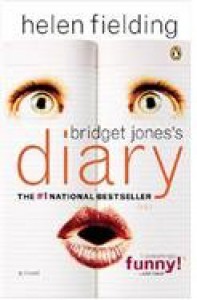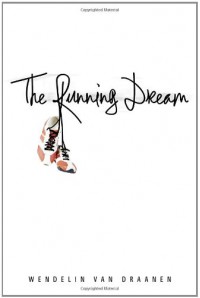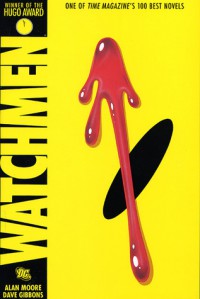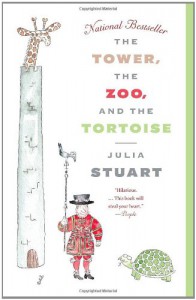Loves books and cats
Best things in life: books, beaches, cats, chocolate, sunsets, sleep
Bridget Jones Diary

This is an iconic chick lit novel. It concerns a thirty-something British
working woman. Bridget is constantly worrying about men, her weight, being single, men, her weight, how hung-over she is, being single, men, her weight, her clothes, being single… well you get the idea. It details her life over the course of one year in the form of, as the title indicates, her diary. Actually Bridget’s story is less interesting than her mom’s story which has much more drama. I read this novel for my literary exploration challenge, but I had always planned on reading it since it was made into a movie (which I’ve never seen). I thought that surely it had a little more to it than the typical chick lit story since it was made into a movie. Wrong. It was very typical – entertaining and a light, easy read when you want that kind of thing. I know that there are two sequels to BJD but since this genre is not really my thing, I’m pretty sure I’ll give them a pass
The Bridge of San Luis Rey

I am having a hard time reviewing the books I've been reading lately because my reaction to so many of them has been tepid. Very, very tepid. I can say nasty things if I hated something or rave if I loved it. But what does one say to "Oh that was just okay." The Bridge of San Luis Rey is one of the so-so novels for me. It won the Pulitzer Prize but that doesn't make it great in my book.
The story begins with the collapse of a bridge in San Luis Rey, Peru in 1714. A friar who witnessed the collapse and the death of the 5 people on the bridge begins to ponder why these particular people died. He seeks some sort of cosmic answer to the question - why them? So he asks anyone and everyone who knew them and compiles all sorts of facts about their lives. And parts II, III and IV of the novel each focus on one or two of the people and who they were.
Part II is about the Marquesa de Montemayor, a woman obsessed with her daughter. It is all about parental love that is overwhelming but doesn't seem to be returned by the daughter. A young girl, Pepita, is taking care of the Marquesa when she travels to the bridge and is one of the 5 to die. Part III is about Esteban who was taken to a convent at birth and left with his twin brother to be raised in the convent. The twins are closer than even most twins and feel no need for anyone else until the twin, Manuel, falls in love with an actress. So this story focuses on brotherly love. And finally part IV is about Uncle Pio who is a man who spends much of his life training Perichole, the actress with whom Manuel fell in love. Uncle Pio loves Perichole with a romantic love that he does not ever expect to be returned by the object of his love.
So love is the overriding theme of this novel. The other theme, about the idea of whether God chooses those who are wicked or deserving of death more than others who crossed the bridge that day, is interesting but not ultimately answered. I mean who can know the mind of God, if there is one. And Brother Juniper, the friar, seems to discover that not one of the 5 people who died was wholly good or bad, and therefore deserving of death over anyone else. Very universal themes really.
And the Mountains Echoed

This is a book of a beautiful tapestry of stories. This tapestry has interlocking stories, some of which meander away quickly and you wonder if and when we will pick up that part of the story again. Other parts seemingly have little to do with the overall picture but ultimately provide their important scenes which prove necessary to the whole.
We begin with Abdullah, a ten year old Afghan boy and his three year old sister, Pari, who live in a small poor village. Pari is the most important person in the world to Abdullah. Their father takes them to Kabul where he has taken a temporary job with a rich man who employs his brother-in-law. Pari is taken from them while they are in Kabul, which devastates Abdullah but there is nothing he can do. Abdullah and his father now exit the stage.
It would seem that we will hear much of Pari's story, but soon she steps out of the picture as well. We focus now on Nabi, the brother-in-law employed by the rich man, Mr. Wahdati. This is the story we finally stick with for a while. We learn much about Nabi including some about his younger years and about his twin sisters, one of whom is Pari's and Abdullah's step-mother. After we've exhausted the story of Nabi, we take a short detour and are introduced to Markos, a Greek doctor who becomes Nabi's tenant in Kabul during 2002 shortly before the US invasion. We learn about Markos in his youth, not Markos the doctor.
Finally we return to Pari who is all grown up now. And Pari's story is longer, more involved and covers many years compared to all the other stories. But this is who we really want to know about. We finally get to see what happened to the pretty little 3 year old who was taken from her father and brother.
Looking at this review, the stories sound so random and disconnected. But they aren't at all. They are interwoven with stories of love, sacrifice, betrayal and devotion and each is an important part of the whole, including a couple that aren't mentioned here. It is a masterful weaving of stories that Hosseini achieves
Brideshead Revisited

God, these classics can be tedious. Yes the themes are universal - in this case struggles with faith, sexuality. friendship, family ties, etc. But it doesn't make it necessarily all that interesting to read. Truthfully it was decent for about the middle half. I'm not sorry to have spent the time on it, but it won't be one I highly recommend either.
The Phoenix Cycle

I got this as a giveaway on Booklikes and I enjoyed it, but I didn't know it was a short story. This was like a big tease; there needs to be more even with a short story. And I have no idea what the first chapter had to do with the rest of the story. It didn't really get tied in later so that was confusing. Well written but where is the rest of the story? We're left hanging so that's why it only get 2-1/2 stars.
The Running Dream

Nice and enjoyable book that isn't preachy or depressing despite being about handicaps. Jessica is a teenager who has lost her leg in a vehicle accident and must learn to live with this condition when the biggest part of her life has been as a runner. She probably gets through her trials easier than I suspect most anyone would, but it doesn't matter that much. It was a decent story anyway, and the focus on her friend Rosa at the end was great. Rosa has cerebral palsy and she has some things to teach Jessica

I can appreciate that this novel is one of the best of its genre, but I knew I wouldn't like it. I only read it for my literary exploration reading challenge, and I was pretty sure that I wouldn't like graphic novels. I have never been a fan of comic books, and this novel does not change that despite the adult (and rather depressing) content. It was sometimes hard to follow with a few overlapping stories. I did enjoy the fact that the costumed crusaders, if you will, are not superheroes in the traditional sense. None of them actually have superpowers except Dr. Manhattan. And he's no longer actually human, so he doesn't really count. All of the others are just regular people who decided to act as vigilantes and donned costumes to do so. I was never a fan of Spiderman or Superman, so I liked the regular people aspect. Basically I am seriously happy to be done with this book and that's why I read it now to get it out of the way. Good decision for me.
I don't have any idea if the movie version of Watchmen is anything like the book, but I won't watch it and find out. Alan Moore doesn't like the movie versions of any of his books, and I'll trust his judgment on that.
Nice

Bill Bryson makes you feel like you are sitting next to someone telling you some stories about the summer of 1927 instead of listening to some dry, boring historian. And some fairly momentous events happened that summer. Most of the events I knew a little about but much less than I thought such as Charles Lindbergh's historic flight from New York to Paris in the Spirit of St Louis. And about Prohibition in Chicago and Al Capone. Some events I had never heard about like the massive flooding all over the Midwest. This overview of 1927 includes plenty of background on the events and the individuals involved, so you don't need to know much beforehand. If you enjoy baseball, you'll like reading about the amazing season the New York Yankees had and Babe Ruth in particular. I seriously dislike the Yankees but since this was 87 years ago, even I can feel good about their accomplishments. One Summer was just as enjoyable as all of the other books by Bill Bryson I've ever read.
Reading challenges
I am trying 2 different reading challenges this year. I've noticed that some people participate in several challenges, but I feel like too many challenges would dictate what I read to the point that I am reading stuff other than what I really want to read. I guess I'll see how these two challenges go to see if I want to try more next year.
The first challenge is the literary exploration group insane challenge on Goodreads. It requires reading 36 books, each from a different genre. I've already picked my books for each genre so that I don't have to worry about it as I go along. I, of course, could change some as I go. I was completely unfamiliar with a few of these genres even though I am pretty good about reading various kinds of books, so I am excited to try some new things. My picks are below for this challenge.
Action/Adventure- Patrick O'Brian - Master and Commander
Auto-Biography/Biography-Doris Kearns Goodwin - Wait Till Next Year
Chick-Lit- Helen Fielding - Bridget Jones Diary
Childrens Book-E. B. White - Charlotte's Web
Classics-Zora Neale Hurston - Their Eyes Were Watching God
Contemporary/Drama- John Grisham - Sycamore Row
Cyberpunk/Steampunk-Neil Gaiman - Neverwhere
Dystopian/Post-Apocalyptic-Cormac McCarthy - The Road
Epic- Ken Follett p Fall of Giants
Erotica-Vladimir Nabokov - Lolita
Espionage-John Le Caree - Tinker, Tailor, Soldier, Spy
Fantasy- J.R.R. Tolkien - The Lord of the Rings
Graphic Novels- Alan Moore - Watchmen
Gothic- Mary Shelley - Frankenstein
Historical Fiction- Erich Maria Remarque - All Quiet on the Western Front
Horror- Joe Hill - NOS4A2
Humour- Christopher Moore - Lamb: The Gospel According to Biff, Christ's Childhood Pal
Literary Fiction- Hilary Mantel - Wolf Hall
Magical Realism- Jose Saramago - Death with Interruptions
Mystery- Dennis Lehane - Shutter Island
Non Fiction- Bill Bryson - One Summer: America, 1927
Paranormal/Supernatural- Lev Grossman - The Magicians
Philosophical- Albert Camus - The Stranger
Poetry- Billy Collins - Ballistics
Pulp – (Hard-Boiled or Noir) James M Cain - The Postman Always Rings Twice
Romance- Debbie Macomber - Rose Harbor in Bloom
Science Fiction- Robert Heinlein - Stranger in a Strange Land
Self Help/Educational- John Pearson - Learn Me Gooder
Short Stories- George Saunders - Tenth of December
Thriller- Lisa Gardner - Touch and Go
Travel- Rich Ochoa - One Way Ticket to Anywhere
True Crime- John Berendt - Midnight in the Garden of Good and Evil
Urban Fantasy- Cassandra Clare - The City of Bones
Victorian- H.G. Wells - The Invisible Man
Western- Cormac McCarthy - All the Pretty Horses
Young Adult- Stephen Chbosky - The Perks of Being a Wallflower
The second challenge I am doing is doing is to continue reading the best novels of the 20th century that I started last year. I originally wanted to read at least 25 per year, but I've dropped that this year to one a month. I wasn't enjoying reading some of those novels as much as I would have liked, so I will spend a little less time on them. I've incorporated as many of them as I could into my other challenge. I've created a shelf for each challenge to help keep track.

This only gets two stars based on a couple of different things. I took stars away because too much of this book pretty much bored me to tears. It was so slow in the parts where George Smiley is essentially acting as a detective. Is there a mole in the British Centre intelligence office or not? And if so, who is the mole? That sounds interesting but he plods through reports with excruciating thoroughness, and the reader has to plod through all the information in those reports with him. Then I took away another star because there are just so many people involved in the various stories that it is hard to keep track. I was a full third of the way through the novel before I felt like I had a glimmer of understanding of what was going on, and it was only a glimmer not full understanding.
I’ve seen quite a few other reviews that noted that this novel is slow but they still enjoyed reading it. Slow parts don’t necessarily kill a story for me, but in this case it detracted from the overall enjoyment so much, I can’t rate it highly. I enjoyed The Spy Who Came in From the Cold despite its lack of action, and I had high hopes for Tinker as well, but I probably won’t try any more Le Carré novels since this is obviously his typical style. However, if you enjoy intricately plotted spy novels and don’t require much action at all, Le Carré will probably be just the author for you

Don’t read this book if you are depressed or need some kind of feel good story. This is full of murder, rape, and generally depressing stuff. And yet, it one of those novels that you want to know what is going to happen next.
Holy crap, these are some sick individuals in this novel. There are Sandy and Carl who pick up hitchhiking men specifically to torture and murder. And take pictures of themselves doing it. For other characters, it is a wonderful depiction of religious fervor taken to extremes. Willard Russell spends months offering blood sacrifices at his outdoor prayer log to entice God to heal his wife of cancer. He forces his 10 year old son, Arvin, to join him in long prayer sessions at the prayer log, surrounded by the rotting corpses of the sacrificed animals. Roy Lafferty, a lay preacher, believes God has told him that he now has the gift of resurrection. Theodore, Roy’s crippled cousin, demands proof of this new power. Theodore is jealous of Roy’s wife so he suggests that Roy should resurrect her. Roy agrees to kill and then resurrect his wife to show his cousin that the power of God is on him. And shockingly, Roy’s power does not manifest itself as he believed it would.
Then there is Preston Teagarden who is forced to become the temporary preacher of a small church, and he is definitely not a man of god. He loves to seduce young women, enjoying it most when they read from the Bible as he screws them. Preston can’t wait to seduce Lenora, the 16 year old daughter Roy Lafferty left behind as a baby after he murdered his wife and took off. Lenora is the ultimate pious Christian and that is exactly the type of young woman Preston enjoys deflowering.
One of the things I liked best about this book is
(show spoiler)Donald Ray Pollock sure can write, but I gotta say though that I felt almost dirty at times listening to this. I need something nice to read now.

This only gets two stars based on a couple of different things. I took stars away because too much of this book pretty much bored me to tears. It was so slow in the parts where George Smiley is essentially acting as a detective. Is there a mole in the British Centre intelligence office or not? And if so, who is the mole? That sounds interesting but he plods through reports with excruciating thoroughness, and the reader has to plod through all the information in those reports with him. Then I took away another star because there are just so many people involved in the various stories that it is hard to keep track. I was a full third of the way through the novel before I felt like I had a glimmer of understanding of what was going on, and it was only a glimmer not full understanding.
I’ve seen quite a few other reviews that noted that this novel is slow but they still enjoyed reading it. Slow parts don’t necessarily kill a story for me, but in this case it detracted from the overall enjoyment so much, I can’t rate it highly. I enjoyed The Spy Who Came in From the Cold despite its lack of action, and I had high hopes for Tinker as well, but I probably won’t try any more Le Carré novels since this is obviously his typical style. However, if you enjoy intricately plotted spy novels and don’t require much action at all, Le Carré will probably be just the author for you

I wish I could read The Shadow of the Wind, not the novel written by Carlos Ruiz Zafon but the one written by Julian Carax, the novel within the novel. Okay, that’s confusing but this book is about a boy, Daniel, who is taken to the Cemetery of Forgotten Books by his father where Daniel chooses a book that he is required to guard for the rest of his life. He chooses The Shadow of the Wind by Julian Carax, and he is so enamored of the story that it brings him to search for years for the missing but presumed dead author. Ultimately Daniel and Julian Carax’s intertwined stories contain love, betrayal, murder, friendships and excessive amounts of intrigue. Zafon’s story is wonderfully compelling and I eagerly look forward to reading the second book in the series, but I wish I could read the story that made Daniel take the risks that he does to discover the fate of Julian Carax.
A novel about books is always a treat for readers, at least for those of us who have such a passion for books. I’m terribly jealous of Daniel and his father who own a bookshop because they are allowed to spend all day dealing with books. I would probably be in trouble all the time if I were Daniel because I would constantly be trying to sneak away to some hidden corner to read. And though the central story line of TSotW concerns an author and his writings, this novel is actually not so much about books as about a young man who loves a girl and about long-held jealousy that eats away at a person. It has many elements and they are so well done, and I can’t do it justice by describing my reactions to it. It simply needs to be read. I have to include the following quote from one of the book’s important characters that I just can’t resist:
“Bea says that the art of reading is slowly dying, that it’s an intimate ritual, that a book is a mirror that offers us only what we already carry inside us, that when we read, we do it with all our heart and mind, and great readers are becoming more scarce by the day.”
Read this book; you won’t be sorry.
 2
2


 1
1






